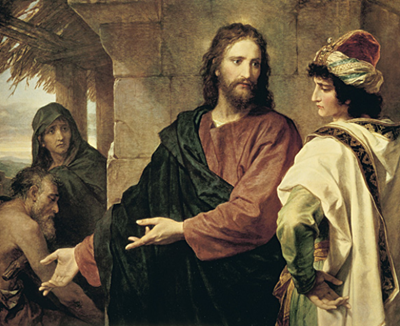Body language reveals a lot about a person and what they are really saying. The gospel writers often help us understand a person’s disposition by describing their physical demeanor. Mark begins today’s story of the exchange between Jesus and a wealthy man by describing the man’s bodily dispositions. Jesus is beginning his journey to Jerusalem. He is deliberately going to the place where he will die and he has been inviting people to become his disciples by following him, “on the way.” This is where the man encounters Jesus. Blocking Jesus’ path and throwing himself on his knees, he seems to give every indication of his willingness to follow the teacher's instructions implicitly and without question. His body language and his humble demeanor speak favorably for him.
 We can see that he is more reflective than impulsive. He is looking for clarity and for a response that might outline a program he could follow to ensure his salvation. His agenda is clear, his approach direct, and his intentions are honorable. However, like many others, he is expecting an immediate solution.
We can see that he is more reflective than impulsive. He is looking for clarity and for a response that might outline a program he could follow to ensure his salvation. His agenda is clear, his approach direct, and his intentions are honorable. However, like many others, he is expecting an immediate solution.
Jesus does not always provide clarity, rarely stipulates a task or program, and refuses to set limits to love. Jesus looks for generous and open-ended commitment, and has come to expand imaginations, not to play political or social games or be limited to theological answers to closed questions. His agenda is as open as God's love, and his perspective is as wide as God's embrace.
Jesus always makes clear that the decision to follow him is a life-altering and demanding one. Did the this man realize how much being a follower of Jesus would require of him - not just at this moment, but during each footstep on the road to Jerusalem and beyond?
Jesus is never one to ask the impossible, only the unlikely and unimagined. His instructions are intended to create connection, collaboration, and community. His "go" will be followed by a "come, follow me!" In this way, the man's initiative will have been transformed into a covenant or bond between the master and the disciple. But that command will also require the man to engage in some very radical and public behavior, and not just private piety or spirituality.
This is a stark, sad story. Such good intentions, such an unsatisfactory ending. But we can also draw some conclusions and applications for our own faith journey.
Jesus asks that we let go of any other central focus in our lives. Whatever draws our primary attention, whatever distracts us from Christ, needs to be put aside. Even our securities and control, in addition to our possessions, must be released, otherwise we will not be open to receiving the “one thing” Jesus offers us - God’s unconditional love. Whatever we hold onto just burdens and makes it harder to get through the opening Christ is offering.
The commitment to follow Jesus is total. We are not able to achieve what is of the greatest value, eternal life, on our own. However with the gift of grace we receive life because, not having anything of our own, we are totally dependent on God. Jesus is asking that we make a total commitment to him, trusting God in our state of littleness.
Body language is one thing. But we must be prepared and willing to let go of whatever hinders our full commitment to the message of Jesus.




